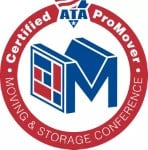We understand that the decision to relocate an elderly parent can be both emotionally charged and logistically complex. So as a senior moving company with decades of moves under our belt (of all ages, near and far), we’ve compiled the comprehensive guide below. This simple checklist provides a simple roadmap for navigating the moving process, ensuring a smooth and stress-free transition for both you and your loved one to their new address.
Understanding the Needs and Preferences of Elderly Parents
Relocating to a new home can feel especially disruptive for older adults. So first and foremost, it’s vital to understand the reasons for the move itself, including:
-
Health Issues: Declining health or chronic conditions may necessitate a living situation that offers assisted living, memory care, and/or home care services.
-
Safety Concerns: If your parent's current residence — for example, your family home — poses safety hazards due to age, mobility issues, and/or proximity to medical care, a move to a single-story home or a retirement community might be necessary.
-
Financial Issues: Rising living costs and/or changes in financial circumstances are often one of the main reasons, requiring a move to a more affordable location.
-
Changing Support Needs: And as your parent ages, their need for daily assistance may increase. Moving to a location with on-site caregivers can therefore be most beneficial. Or an assisted living community/facility, a senior living community (aka a retirement community), or simply just being closer to family members who can provide support.
Choosing the Right Location
Understanding your parent’s individual needs and preferences will help you choose the ideal new location. Consider factors like:
Accessibility: Is the living space easy to navigate? Does the new floor plan include features like ramps, handrails, and/or elevators? In short — will your loved one feel right at home?
Proximity to Family and Loved Ones: And speaking of right at home — will your parent be close to family or friends who can offer support when need be?
Amenities: Does the new residence offer amenities that cater to seniors — such as on-site healthcare, social activities, easily accessible transportation services, and so on?
Cost: And, of course, your budget is essential. So while comparing various living options, get your calculator out and consider potential ongoing costs — such as rent, utilities, transportation, and any additional care services. And think long-term.
5 Practical Steps to Ensure a Smooth Transition
Now that you have an idea of why and where you’re going, you and your loved one are ready for the actual move. Keep in mind that careful planning coupled with open communication are key — both for you and your elderly parent. So take your time, listen, take notes, make sure that everyone’s on the same page, and breathe. To help you do that, here are five simple steps to follow:

Step 1: Downsize & Declutter
As your parents prepare to relocate, help them downsize their belongings. Encourage them to keep cherished heirlooms, collectibles, and essential items — but consider donating, selling, or discarding anything they won’t really use. Online marketplaces and/or a garage sale can be a good call for this initial step. As is OZ’s Ultimate Guide to Decluttering.
This may take some convincing, of course. But remind them that this is ultimately for the best. Because downsizing not only reduces the volume of belongings to be moved and simplifies the unpacking process in the new location. It also allows for a fresh new start.
Step 2: Plan the Actual Move
Planning is key to a smooth, stress-free move. Consider hiring a reputable senior moving company with experience handling delicate belongings and catering to seniors' needs. Like OZ, for example. But either way — get out that pen and paper again and develop a comprehensive moving checklist.
Track not only the physical stuff and logistics involved, but also tasks like utility changes, updating addresses with service providers (Medicare, insurance companies, etc.), transferring prescriptions, and so on. If you can — organize a team of trusted friends, loved ones, and/or professionals to help see you through. And set exact dates to allow for proper timing.
Step 3: Address Legal & Financial Matters
Next, make sure your parent's legal and financial affairs are in order. Consider a power of attorney for yourself or a trusted family member to help manage finances or healthcare decisions if needed. Or consider hiring a senior move manager. Either way, gather and update important legal documents — wills, medical records, etc.
Notify the Social Security Administration, their bank, and any other necessary organizations of the new address. Be sure to communicate with your parent so you don’t miss anything. And generally make sure to have all your paperwork sorted — and in a safe, easily accessible place — well before moving day.
Step 4: Open Communication & Emotional Support
Communication throughout the moving process can not be understated. So actively listen to your parent's concerns, keep them informed, and address any issues that come up in a proactive, productive, and timely manner.
This step can be especially stressful — so stay positive, and remember to prioritize your health as well. Take breaks, keep an open mind, and celebrate milestones and small victories together — such as finding a new residence, decluttering a room, and starting anew.

Step 5: Moving Day Prep
As the big day approaches, start your prep by packing essential items and getting rid of the junk. As you do, coordinate with the movers, friends, neighbors, landlords, loved ones, the new community — and anyone else involved. Ensure tasks are individually assigned, clear instructions are provided, and gratitude is practiced. And, of course, stay present for your loved one. It’s probably tougher on them than it is on you.
Assisting Elderly Parents in Adapting to a New Living Space
There will likely be a few bumps in the road (few moves occur without them) — but you should be able to land on your feet with the steps and checklists above. And once you're there, here's how to help your parent adjust to their new living space:
-Familiarization with the space:
Moving to a new environment can be disorienting — especially for older adults. So make sure toelp your parent get acquainted with the layout of their new residence. For example, mark the location of their bedroom, bathroom, kitchen, and any common areas they'll use frequently.
Take a walk around the building together to familiarize them with amenities (and — if necessary —introduce them to key staff members). For venturing outside the residence, help them locate nearby landmarks, the local grocery store, and so on. This will give them a sense of security and independence in their new surroundings.
-Personalization:
And encourage them to personalize their space by arranging furniture, unpacking belongings, and decorating with familiar items. Let them choose the layout of their furniture to create a familiar and functional living space.
Help them unpack treasured photos, artwork, keepsakes, and anything else they treasure. Decorating their space with familiar items will create a sense of comfort and ownership. And it will also help them feel more connected to their past and — well, more at home in their new environment.
-Social Connection:
No matter what you bring with you though, moving to a new environment can often be isolating. So encourage your loved one to get out when they can, participate in activities and social events offered by the senior living community or local senior center, and stay active and connected. This can help them build new friendships and combat loneliness.
Social interaction is crucial for emotional well-being — so gently nudge your parent to attend social events or group activities offered by the community. These activities could be anything from card games and movie nights to exercise classes or book clubs. And bring the grandkids around too.
And, of course, remember to be there for them too — before, during, and especially after the move itself. Your continued support and presence will be invaluable as they adjust to their new surroundings.

Conclusion
Relocating to a new environment can be a grueling experience for elderly parents — and often for their kids too. Moreover, every moving situation is unique — and tailoring your approach to your parent's specific needs and preferences is essential. By carefully planning and providing support throughout the process, you can ensure as smooth a transition as possible. So remember to prioritize open communication and address any concerns they may have. As they settle into their new home, celebrate your parent’s successes and continue to offer emotional support.
We hope the guide above offers a starting point for navigating the complexities of moving an elderly parent in almost any situation. Because we here at Oz Moving know it’s no easy feat. Which is why we’re ready to have your and your parent’s back — every step of the way, no matter what — too.







